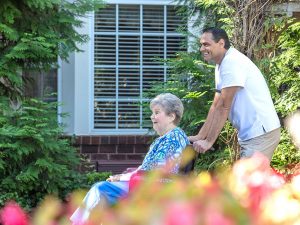Choosing A Memory Care Provider – Tips and Considerations
When choosing a memory care community for a loved one with Alzheimer’s or another form of dementia, the decision can feel overwhelming. Memory care communities offer specialized care designed to meet the unique needs of residents experiencing memory loss, but not all communities are the same. Asking the right questions can help you assess the quality of care, safety, and overall environment for an older adult.
Below, we’ve expanded our list of important questions to ensure you’re fully prepared to evaluate potential memory care providers and find the best fit for your loved one’s quality of life.
Start with an Honest Assessment of Your Loved One‘s Needs
Before reaching out to memory care communities, take time to evaluate your loved one’s care needs and the level of care required. Here are some questions to guide your assessment:
- Does your loved one need 24/7 supervision or occasional monitoring by caregivers?
- What is their mobility level? Do they require assistance walking or transitioning from one space to another?
- Are they able to complete activities of daily living (ADLs) such as dressing, bathing, and eating independently?
- Do they require support for incontinence care or other toileting needs?
- Does your loved one exhibit wandering behaviors or tendencies to seek exits?
- Are there any behavioral concerns like aggression, confusion, or anxiety that need specialized attention?
- Are there ongoing medical treatments or chronic conditions that require skilled nursing or regular interventions?
Understanding these specifics will help you focus on communities equipped to meet your loved one’s unique needs.
Questions to Ask Memory Care Communities
When touring memory care communities, it’s crucial to ask targeted questions to assess their services, staffing, and environment. Use this list of questions to guide your conversations:
1. Staff and Training
- What is the staff-to-resident ratio during the day and at night?
- Are there staff members specifically trained in dementia care? What does their ongoing training entail?
- Is there a registered nurse or other medical professional on-site 24/7?
- How does the community handle medical emergencies or sudden health care changes?
- Are care staff trained to manage challenging behaviors, like aggression or resistance to care?
- What is the tenure of their staff?
2. Care Services
- How are care plans personalized for each resident?
- What medical services are offered on-site? Are there visiting physicians, physical therapists, or occupational therapists?
- Does the community provide assistance with medication management?
- What steps are taken to adapt care as residents’ needs change?
- How does the community address residents with significant memory loss or advanced Alzheimer’s disease?
3. Daily Living and Activities
- What does the activities schedule look like? Are there programs that encourage social interactions, wellness, or creativity?
- Do you offer dementia-specific therapies, such as reminiscence therapy, music therapy, or pet therapy?
- How do you ensure residents have access to meaningful social activities and routines?
4. Safety Features
- What safety features are in place to prevent wandering or accidents? For example, secure entrances, alarm systems, or enclosed outdoor spaces.
- Is the building designed to be easy for residents to navigate while maintaining their independence?
- How are nutritional needs addressed? Do you provide specialized meal options for residents with swallowing or dietary issues?
5. Community Environment
- What is the overall atmosphere of the community? Does it feel warm, welcoming, and homelike?
- Is ownership local and/or on-site regularly?
- Are there opportunities for family members to stay involved in the long-term care process or visit regularly?
- Are residents grouped by type of care or cognitive ability to ensure personalized and appropriate support?
6. Costs and Financial Considerations
- What is the pricing structure, and what does the monthly fee include?
- Are there additional charges for specialized medical care or ADLs support?
- Is financial assistance available, such as Medicaid or veterans benefits?
- How does the community handle transitions to higher levels of care, and are those services provided on-site or off-site?
Evaluating the Fit for Your Loved One
In addition to asking questions, observe the environment and interactions during your visit. Consider these factors:
- Do staff members seem compassionate and competent in their roles?
- Are memory care residents engaged in social activities or participating in the daily schedule?
- Does the community appear clean, organized, and safe?
- Are residents’ specific needs, including those related to Alzheimer’s or advanced dementia, clearly prioritized?
Why These Questions Matter
The answers to these important questions will give you a clearer picture of how the community can support your loved one’s well-being and ensure their care needs are met. A great memory care community will not only prioritize safety and medical services but also focus on enhancing residents’ quality of life through personalized care, meaningful engagement, and a supportive environment.
Why Choose Parc Provence?
At Parc Provence, we specialize in dementia care and offer a supportive, nurturing environment for memory care residents. Our trained staff provides personalized care designed to meet the evolving needs of individuals with Alzheimer’s and other memory impairments. With on-site medical services, a vibrant activities schedule, and top-tier safety features, our community is dedicated to providing exceptional quality of care.
We invite you to visit Parc Provence to see how we can support your loved one’s wellness and independence. Contact us today to schedule a tour or speak with one of our senior living advisors. Let us show you how our community offers a secure, enriching environment for your family.





